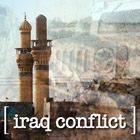
|
BUSH ANNOUNCES PLANS TO SEND 21,500 MORE SOLDIERS TO IRAQ
FACING INCREASING CALLS FOR PHASED WITHDRAWAL, IGNORING IRAQ STUDY GROUP ADVICE, BUSH TAKES RESPONSIBILITY FOR WAR'S MISTAKES 11 January 2007 After much speculation and many leaks, US pres. George W. Bush has announced he will send more than 20,000 additional soldiers into Iraq warzone, will require Iraqi government to take action against sectarian movements fomenting violence across Iraq. Bush also said that "Where mistakes have been made, the responsibility rests with me". Democrats in both houses of Congress have been critical both before and after the speech. Sen. Edward Kennedy (D-MA) said in a speech the other day that he would oppose the move unless it is approved by a vote in Congress and supported by dedicated new funding. Reaction by Democrats to hearing the plan Bush announced was that it will be "too little, too late", and that it is a mistake to now oppose the advice of experts and commanders. The Iraq campaign has cost the US government over $300 billion to date, and with the escalation now in the planning, it appears the rate of expenditure will continue to increase. The US president said, in his address to the nation, "political and sectarian interference prevented Iraqi and American forces from going into neighborhoods that are home to those fueling the sectarian violence", adding "This time, Iraqi and American forces will have a green light to enter those neighborhoods". He acknowledged the coming year would likely be "bloody and violent". The deployment of new troops will focus mainly on Baghdad, and the problem of sectarian violence across the capital. While the plan to enter neighborhoods where tensions have already kept the US military from taking action may lead to an escalation in bloodshed, Pres. Bush warned that withdrawing from Iraq could lead to the collapse of the Iraqi government. The government has said it welcomes the deployment as a "sign of hope", but that it will not be easy to quell the mounting sectarian violence. And, there are concerns that the conflict could spread, if counter-insurgency air-raids are extended to neighboring countries. Ignoring advice by the politically neutral Iraq Study Group that the US must work with the governments of Iran and Syria to help reduce support for the insurgency, Pres. Bush also announced he plans to confront the two states: "These two regimes are allowing terrorists and insurgents to use their territory to move in and out of Iraq... We will disrupt the attacks on our forces. We will interrupt the flow of support from Iran and Syria... And we will seek out and destroy the networks providing advanced weaponry and training to our enemies in Iraq" explained Bush. Just today, US forces raided the offices of Iran's representative in the city of Arbil in northern Iraq. At least 5 individuals, said to be employees of the Iranian government, were detained in the raid. According to Turkey's Sabah news service, "Iraqiya state television said U.S. forces also confiscated computers and documents in the raid on the building in central Arbil. A Kurdish station said Kurdish security forces had taken over the building after the Americans left the area". The major showdown between the president's proposed war policy and the Democrat-controlled Congress will relate to budget issues. According to Bloomberg News, "Bush said Maliki has pledged to strengthen his military and allocate $10 billion to stabilize and rebuild Iraq", while Bush's plan is thought to involved roughly $5.6 billion in new spending. The plan also includes spending "$1 billion more for an expansion of reconstruction programs and other economic aid." Operations in Iraq and Afghanistan since the fall of 2001 have so far cost over $500 billion, prompting Democrats to promise they will seek to bring the budget under control and seek restraint in both military spending and action. [s]
RELATED STORIES: As the 5th anniversary of the attacks of 11 September 2001 approach, the US Senate's Intelligence Committee has issued a report officially finding that Saddam Hussein never collaborated with al-Qaeda in any sense. In fact, he was hunting Abu Musab al-Zarqawi, who would later name his organization "Al-Qaeda of Mesopotamia" or as per Pentagon briefings "Al-Qaeda in Iraq". [Full Story] DESPITE THOUSANDS OF CIVILIAN DEATHS, FEW MURDER CASES HAVE BEEN BROUGHT IN IRAQ WAR While prisoner abuse has been a widely reported charge, with shocking images and public outrage to keep attention on the subject, there has been relatively little similar public outrage expressed over situations where civilians have died in questionable circumstances. The Washington Post reports there has been a tendency not to investigate many such deaths, with top officials saying "in private" that there's "a tendency to consider Iraqi civilian deaths an unintended consequence of combat operations". [Full Story] MOST WANTED INSURGENT LEADER KILLED IN AIR-STRIKE Reports from Baghdad suggest Abu Musab al-Zarqawi was killed by a US airstrike on 7 June 2006. The official announcement was made by Iraq's prime minister Nouri al-Maliki, and was later confirmed by US Gen. Casey. The White House issued a statement of cautious relief, saying the removal of Zarqawi could be a moment of hope for Iraq, but will not end the ongoing sectarian and insurgent violence. [Full Story] NO WMD, JUSTIFICATIONS FOR WAR IN QUESTION David Kay, chief weapons inspector for the Iraq Survey Group, who recently left his post, reports there was no evidence to indicate the presence of any weapons of mass destruction, any stockpiles, or any competent programs to develop such weapons. Kay said evidence was found that indicated there had been programs in the past, but that it appeared that all the weapons had been destroyed, and that the programs were in disarray, and no production facilities existed. [Full Story] |
||||||||||
|
|||||||||||







